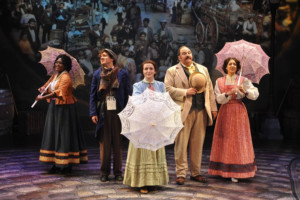Review: TINTYPES Plays a Patriotic Tune at Porthouse Theatre/Kent State University

It is reasonable, with the Cleveland Orchestra playing its annual "Salute to America" at Blossom, just yards away, and POTUS going through what appears to be his childhood dream of having tanks, planes and fireworks light up the nation's capital for its birthday, that Porthouse Theatre get into the mood by staging "Tintypes," a musical revue with almost fifty patriot songs.
The Mary Kyte, Mel Marvin and Gary Pearle musical is a tuneful, high-level composite of popular songs from 1890 to 1917, the highlight period of American immigration. It's the era often called "America's last age of Innocence." It's the era when the newbies were taught the American way through song, dance and razz-ma-tazz musicals.
The 1917 cut-off date is significant as it was in that year that the U.S. Congress enacted The Literacy Act,the country's first widely restrictive immigration law.
This was reinforced with the passing of the Immigration Act of 1924 whose purpose was to "distinguish the United States as an autonomous political community." The term often serves to explain efforts to reinforce the national identity and stress self-determination of national and international affairs.
That legislation, strongly backed by "nationalists," who strongly believed in "nativism," "perceived Jews, Muslims, [Asians], agnostics and naturalized citizens as something less than truly American."
(Side note: it is this same type who believe that to be an American means to be "white, Christian and male" and, therefore, today are strongly in favor of legal and physical walls being built to exclude Latinos from immigration.)
The musical tells the story of pre-anti-immigration times. It's the era that changed the cultural and ethnic makeup of the nation. "The transcontinental railroadand Carnegie Hallwere built, electricityand the telephonewere introduced to homes, cowboyTheodore Rooseveltbecame President of the United States, automobilesjoined horse-drawn carriages on city streets, and children worked in factoriesfor twenty-five cents a day."
The score features works by George M. Cohan, John Philip Sousa, Scott Joplin, and Victor Herbert. It's quintessential Americana at its most glorious flag-waving apex.
Starting with the immigrants, who thought to be "The Yankee Doodle Boy" was the goal for every new arrival to "Stars and Stripes Forever," the revue showcases the dreams and aspirations of the country at the turn of the century.
The tale shifts to investigating growth and industrial creativity as "Electricity" and "The Factory" are sung.
The bully attitudes of Teddy Roosevelt, the joys of being, as expressed in "The Ragtime Dance" and the power of the country as showcased in "I Want What I Want When I Want it" flow rapidly and climaxes in a fireworks of patriotism highlighted in "You're A Grand Old Flag" and a repeat of "The Yankee Doodle Boy."
The revue ran for 137 performances in its off-Broadway presentation and then another 93 performances when it was moved to a Broadway theatre.
The Porthouse production, nicely directed and choreographed by Eric van Baars, with fine musical direction by Jennifer Korecki, is a cornucopia of enthusiasm.
On opening night, the production was aided by a loud 4thof July fireworks display at the conclusion of the national birthday celebration by the Cleveland Orchestra, which shares the grounds with the theatre, which paralleled the finale of the play.
The cast all had strong voices, interpreted the meanings of the songs, had the right patriotic attitude and nicely performed the creative choreography.
Highlight numbers included "In My Merry Oldsmobile," "What It Takes to Make Me Love You-You've Got It," "Shortnin" Bread," "The Ragtime Dance," "Then I'd Be Satisfied With Life," "When It's All Goin' Out and Nothing Comin' In," and "We Shall Not Be Moved."
Devin Pfeiffer, he of expressive face and boyish charm, was delightful as Charlie, the immigrant. He has a nice sense of comic timing and dances with joy and skill
Beautiful Shamara Costa is a talented singer and actress. She who developed a Susannah who lit up the stage each time she appeared.
Mavis Jennings made for a bully good Teddy (Roosevelt).
Samantha Kennett had the right attitude and voice to portray the firebrand known as Emma Goldman, the union organizer and voice of the people.
Josy Soriano delighted as the manipulative Anna Held.
Ryan T. Patterson's set, consisting of a back wall illumination of the lower east side of New York, and a cobblestone painted thrust stage, nicely set the mood. Susan J. William's costume designs were era correct.
The show is a little long, and would have been helped by cutting or eliminating the vaudeville scene, which at best, was mildly humorous.
CAPSULE JUDGMENT: "Tintypes" is a musical revue which reminds of the desires, values and worth of immigrants. It reinforces the idea of why the less fortunate of the world are willing to risk their very lives in their desire to live the American dream. In its own way, it highlights the present battle over immigration.
"Tintypes" runs at Porthouse Theatre through July 20, 2019 For tickets call 330-672-3884 or go online to http://www.porthousetheatre.com/.
NEXT UP AT PORTHOUSE:"The Music Man," Meredith Wilson's delightful "Seventy-Six Trombones" tale of con-artist Harold Hill who learns that love can lead to unexpected endings. (July 25-August 11)
Videos

